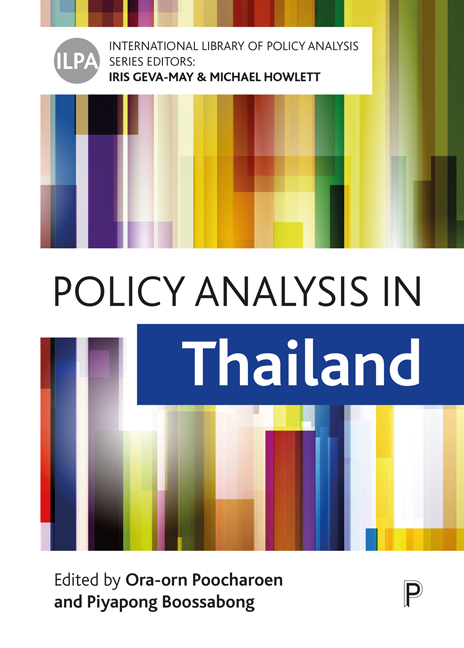Book contents
- Frontmatter
- Contents
- List of figures and tables
- List of abbreviations
- Notes on contributors
- Editors’ introduction to the series
- Introduction
- Part One History, styles and methods of policy analysis in Thailand
- Part Two Policy analysis within executive government
- Part Three Policy analysis beyond executive government
- Part Four Political parties and interest groups in policy analysis
- Part Five Policy analysis education and research
- Index
four - Policy analysis in Thai local governments
Published online by Cambridge University Press: 20 January 2024
- Frontmatter
- Contents
- List of figures and tables
- List of abbreviations
- Notes on contributors
- Editors’ introduction to the series
- Introduction
- Part One History, styles and methods of policy analysis in Thailand
- Part Two Policy analysis within executive government
- Part Three Policy analysis beyond executive government
- Part Four Political parties and interest groups in policy analysis
- Part Five Policy analysis education and research
- Index
Summary
Introduction
The decentralisation process and local government reform experienced in Thailand since the late 1990s have led Thai local governments to embark on an analysis of their policies. Essentially, the Constitution of the Kingdom of Thailand B.E.2540 (1997) and the Determining Plans and Process of Decentralisation Act B.E. 2542 (1999) were promulgated to guarantee the autonomous status of local governments. This means that Thai local governments are authorised by law to have a considerable degree of autonomy over local development planning and budgeting, with respect for the demands of local citizens through public participation processes (Krueathep, 2004).
Interest in local governments’ policy making has increased since the decentralisation era. Much of the Thai literature examines local governments’ planning and budgeting processes and activities by using the regulations and guidelines of local development plans that are issued by central government agencies. However, research that focuses on how and how much local governments can develop their own policies and initiatives is somewhat limited.
This chapter seeks to provide a fresh insight into policy analysis as revealed through the investigation of the autonomy of Thai local governments over policy making. Essentially, the legal-institutional framework is employed to examine the formulation of local development plans – the most important official local policy documents – and the activities relating to it. It draws on content analysis of relevant documents, non-participatory observations of meetings at both national and local levels and interviews with local governments’ mayors and officials.
The findings demonstrate that policy analysis in Thai local governments is considerably centrally driven, that is, planning processes and activities are shaped and intervened heavily by central government's interventions, particularly laws and regulations. Local planning is, therefore, centralised and standardised in both processes and formats. This forced local governments to focus greatly on following regulations, guidelines and templates for developing plans instead of paying attention to actual policy design and learning. Moreover, the latest military government revitalised the past legacy of centralisation and restored the hidden bureaucratic dominance which undermines local governments’ power and autonomy over local policy development.
- Type
- Chapter
- Information
- Policy Analysis in Thailand , pp. 67 - 87Publisher: Bristol University PressPrint publication year: 2023



